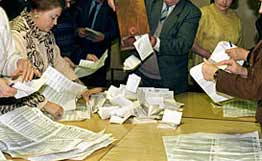
AZERBAIJAN RESPONSIVE TO ELECTION OBSERVERS’ CRITIQUE DESPITE EXAGGERATIONS
Publication: Eurasia Daily Monitor Volume: 2 Issue: 208
By:

Quite predictably (from past experience, and in a novice parliamentary system) many local irregularities were recorded in Azerbaijan’s November 6 parliamentary elections. Equally predictably from all opinion surveys, the irregularities could not affect the clear-cut overall victory of President Ilham Aliyev’s Yeni (New) Azerbaijan Party. Reports of irregularities proliferated because tens of thousands of Azeri observers were accredited to watch the balloting and vote counting at the polling stations, and no fewer than 1,800 candidates ran in only 125 single-mandate electoral districts — a frustration-breeding ratio of 14:1 that itself testifies to the immaturity of the country’s recently introduced parliamentary system.
The International Election Observation Mission’s (IEOM) preliminary assessment of the elections (IEOM Press Release, November 7) clearly fails to do justice to Azerbaijan’s demonstrable progress in this campaign (see EDM, October 27, 28) compared to the past elections. The assessment’s Summary — which is the political heavy-hitter, since few senior Western decision-makers or opinion-makers will study the full text — simply fails to mention the progress achieved. While many of the criticisms are justified, the overall message remains one-sided and unfair as long as the progress is not recognized.
The IEOM is an undertaking of the OSCE’s Office for Democratic Institutions and Human Rights (ODIHR), the Council of Europe’s Parliamentary Assembly (CEPA), the European Parliament, and NATO’s Parliamentary Assembly. Within that constellation, some cleavages could be noted. Some of IEOM’s American members were the most one-sided in their judgments, apparently with a predominant impact on the IEOM report. Congressman Alcee Hastings, introducing IEOM’s report at the post-balloting news conference, opined, “The elections did not meet Azerbaijan’s international commitments” (IEOM Press Release, November 7; ANS TV, November 6) although the report actually said that the election “did not meet a number of commitments.” Hastings’ amply televised statement is apt to impact on the local political arena more heavily than the report, which few will have read. Human Rights Watch (HRW) went so far as to have prejudged the election without appeal: “The Azerbaijani government has extinguished the possibility of free and fair elections” (HRW press release, October 31). HRW also declared, “The government has failed to adopt [the] measures proposed by the international community,” although the government had in fact adopted almost all of those measures and was commended for it by the U.S. government among others.
European observers representing CEPA and the European Parliament were more balanced in their comments, acknowledging some of the progress that had been registered during the campaign. In Washington, State Department spokesman Adam Ereli’s statement clearly acknowledged some of the progress made (Reuters, November 7), thus striking a different note than the IEOM’s report. Inasmuch as the latter seemed to be shaped mainly by the OSCE’s ODIHR (through the American contingent, in which Hastings is chairman of the OSCE’s Parliamentary Assembly), the State Department’s statement would seem to indicate an exception in this case from the usual unconditional acceptance of OSCE ODIHR judgments.
Azerbaijan’s authorities, however, have no intention to evaluate the evaluators. President Ilham Aliyev and his government are demonstrating responsiveness to the critique. In a post-midnight appearance on television, Aliyev said that the authorities would “thoroughly study” the observers’ report, “because their opinion is important to us,” and any election officials involved in criminal violations “will be brought to justice and punished. I will not allow bad officials to cast a shadow on elections.” Aliyev conceded that there had been violations in eight electoral districts (out of 125) (Azerbaijani Television Channel One, November 7). Aliyev’s adviser, Elin Suleymanov, also told the press that complaints will be considered swiftly, with measures taken against violators, and there will recounts (AP, November 6). On the following day, Central Election Commission Chief Mazahir Panahov confirmed that there were problems with the vote counting and tabulating in 10 electoral districts, and suggested that recounts will be held there (Turan, November 7).




